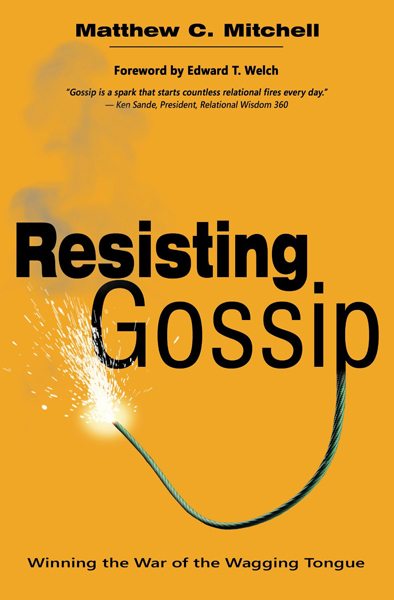When I received a copy of Matt Mitchell’s book, I first wondered if it was worth making time to read. It’s one book about one sin, and a sin I wasn’t particularly alarmed by. I was more conscious of other areas of my life that needed attention. I also wasn’t in a church being poisoned by many gossips.
Yes, I’m familiar with gossip, and its cousins backbiting, tale-bearing, and whispering. Forty years into the Christian life, I couldn’t escape such awareness. But this book just seemed too narrow, too particular.
Needed Surprise
I began to read the book abstractly, wondering if it would be helpful to people I know who have problems with gossip. But the book surprised me. In a personal and practical style, Mitchell spoke to me. He defined gossip and told me what it isn’t. Some speech about others is good and necessary, even when it is about their sin.

Resisting Gossip: Winning the War of the Wagging Tongue
Matthew C. Mitchell
Resisting Gossip: Winning the War of the Wagging Tongue
Matthew C. Mitchell
Mitchell, pastor of Lanse Evangelical Free Church in Pennsylvania, helped me understand the draw of gossip. Why is it to alluring? Why does something so simple become bondage? He pressed into motives. I, and others, enjoy inside information. We take pleasure in hearing and passing on bad news. It is power. It is pride.
I could go on. With simplicity and clarity, Mitchell addressed almost every issue about gossip, about how to deal with conversation that becomes gossip, and about how to respond to gossip. He even talked about repenting of gossip. How often have I gone back to people and asked their forgiveness for gossip?
This means Resisting Gossip: Winning the War of the Wagging Tongue is personally useful. It’s also a tool for discipleship.
Relief of the Gospel
Mitchell brings a ministry of the law. The law is necessary. We are all self-deceived or ignorant. We live in a world of gossip. Our lives are filled with hearing and passing on bad news. We traffic in discussing motives, questioning sincerity, and making judgments. Whole magazines are dedicated to passing on conjectures. So are news sources. We are not to be conformed to this world.
The law is light that defines the edges, probes the heart, and equips the conscience. We need definition and clear edges so we know what is right and what is wrong. Mitchell gives that.
But he doesn’t just preach the law; he brings the gospel. Mitchell reminds us again and again of the Savior who bore the sins of our tongue in his body on the cross. He gives hope for forgiveness and change.
Resisting Gossip is also useful for pastors, as an ounce of prevention, in equipping their flocks to preserve unity. The unity of the Spirit is a precious thing, for by it we display the reality of Christ. The unity of the Spirit is also a fragile thing, however. Gossip kills unity. It creates suspicions, diminishes trust, and questions motives. It frays the fabric of unity, and does so invisibly at first. But when conflict goes public, the prejudice and judgments of the heart created and fed by gossip will add fuel to the fires. The fabric will tear.
Further Exploration
So what do I wish were developed more, or addressed in a next book?
First, the book accents personal application. But we need to develop church application as well. We can teach on gossip to prevent it, but we all know it will remain. How do we deal with gossip in a church when it has affected the whole body? When do we address gossip with correction? When do we ignore it? Where do we escalate to corrective discipline? Is it okay to allow open discussion of issues and people in a local church during a time of controversy or discipline?
We also need to address how the sin of gossip shows up in blogging. Is it gossip to pass on local bad news through a global blog? Are Christians independent agents, free to write and say what they wish with no supervision? And should church members be running blogs outside the oversight of their pastors? Are they accountable to overseers if they sin in what they say on a blog? Is every Christian an investigative journalist? Even investigative journalists have editors who determine what they can legally say.
Third, what about going public with the sins of others on a blog, in the name of “tell it to the church”? Just who is the “church” in Matthew 18? All Christians everywhere, or just a local congregation? Are leaders in a different category? Is there public accountability of public leaders? Is it gossip to address the sins of public leaders in a public forum after all private means are exhausted?
Mitchell helpfully defines gossip, but we need to work out the implications for the church and the blogosphere. These sorts of questions must be pursued to deploy the principles in Resisting Gossip to protect local flocks and to guard leaders from malicious accusation on the web.
I think the principles necessary to answer these questions are given in Mitchell’s book, and readers can apply them in their own contexts. Nevertheless, we need a wider discussion for the church as a whole on some of these tragically relevant matters.
Gossip is not a small issue. Loose lips have sunk ships, ruined reputations, and destroyed the unity of local congregations. Protecting each other’s good name is a mark of Christ’s love, and giving diligence to preserve the unity he created means killing gossip. This book will be helpful in pursuing these things.




























